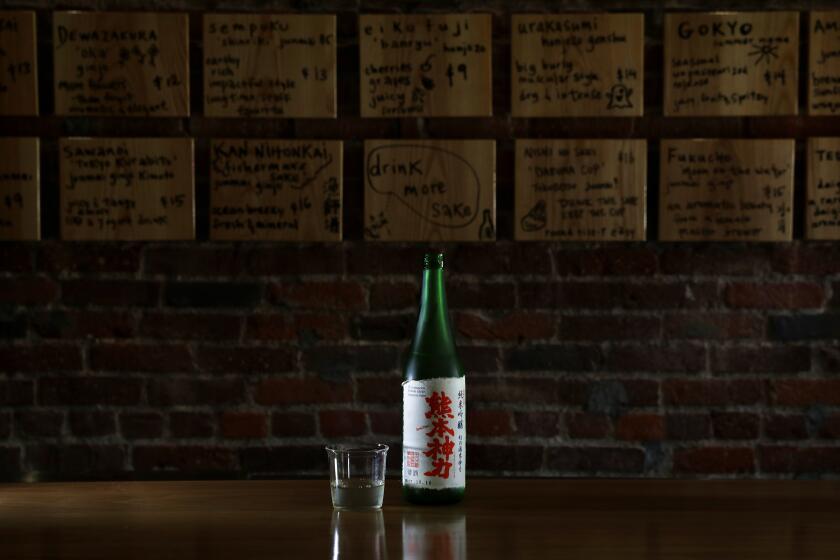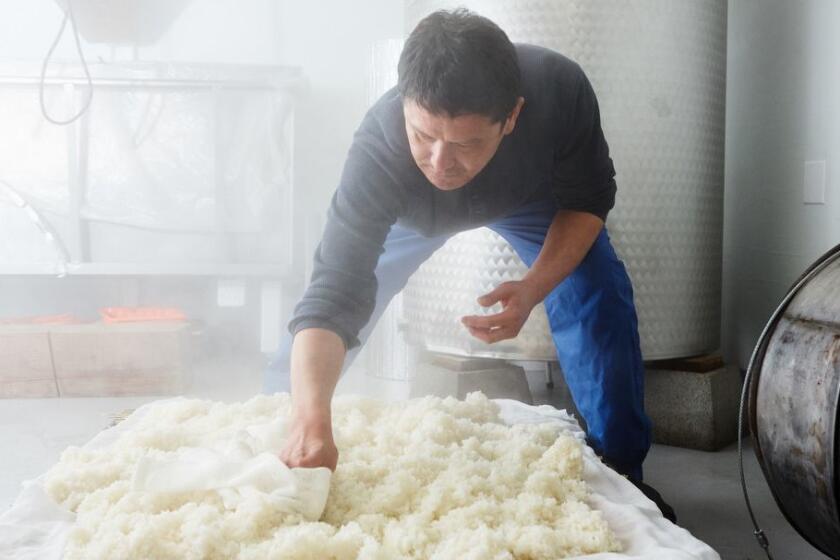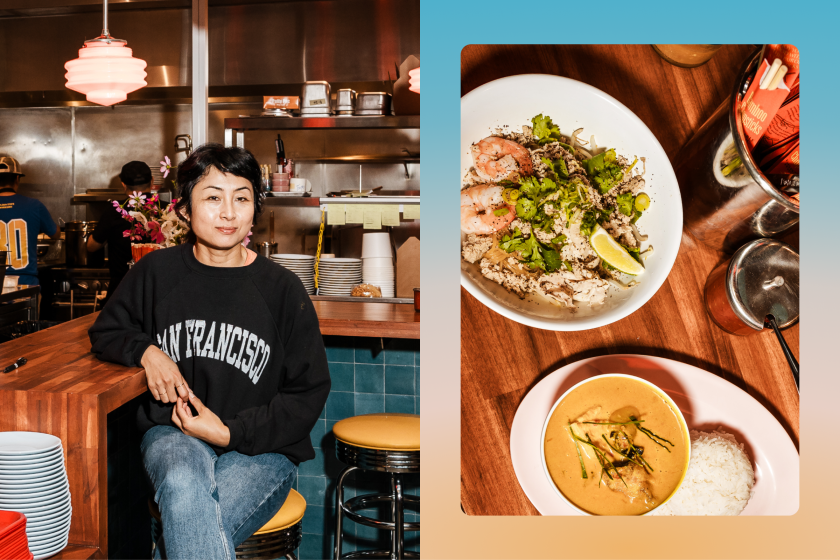Review: Los Angeles, this should be your sake spot
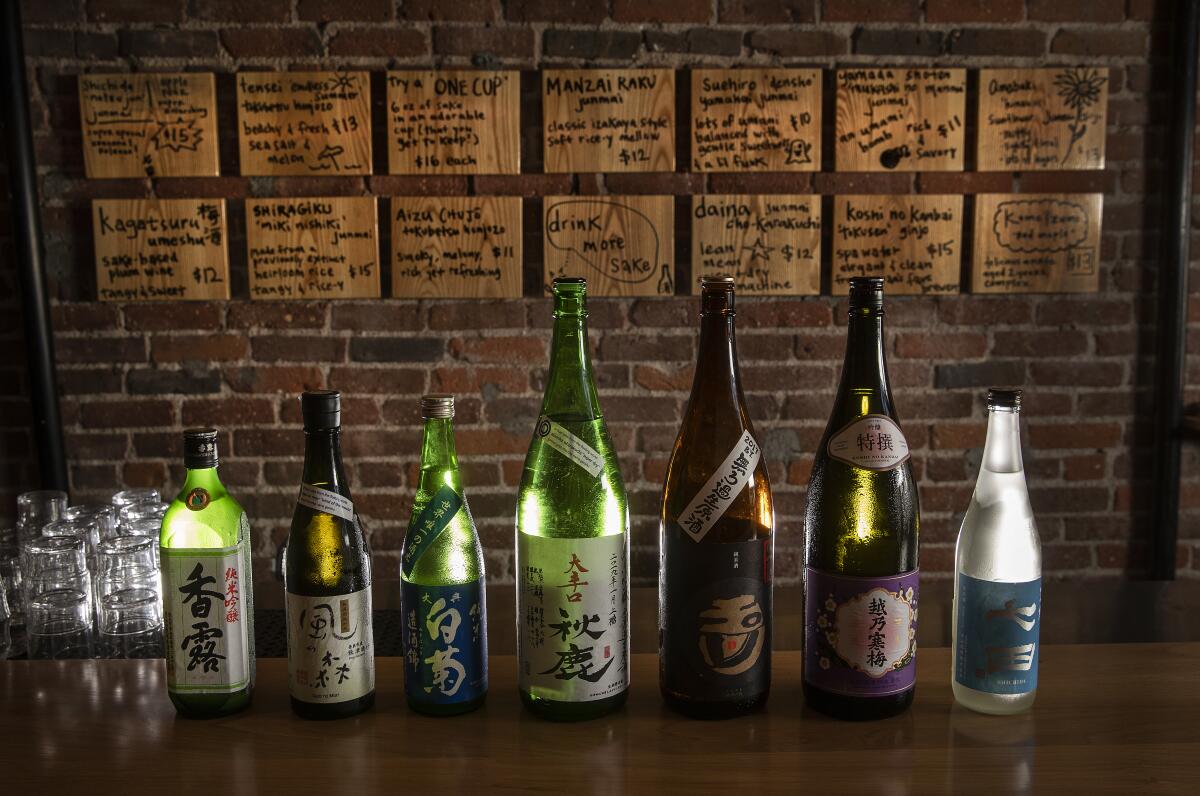
The hot sake served at Ototo in Echo Park does not taste like the inexpensive, abrasive-with-notes-of-rubbing-alcohol hot sake many of us have sipped alongside sushi or hibachi chicken. Tamagawa Tokubetsu Junmai — produced by Kinoshita, a brewery in Japan’s Kyoto prefecture that’s been in operation since 1842 — is a beverage at its most expressive state when heated. Ototo co-owner Courtney Kaplan doesn’t use a thermometer to gauge the sake’s temperature; she warms it, per the brewer’s instructions, until bubbles begin to simmer around its edges.
Its flavors land rich and spicy and autumnal. For a moment, the brain might register mulled cider, but there’s a grainy umami running underneath the brightness that has nothing to do with apple juice. All sakes are the result of multiple parallel fermentations: steamed rice, water and the inoculation fungus called koji reaching clear conclusions together. The fullness of this warmed exemplar stands right up to a burger — piled with chili and slicked with yuzu Thousand Island dressing — that half the room seems to be powering through.
Here’s everything you ever wanted to know about sake, plus what to buy and where to find it.
Resetting notions around hot sake is only one of Ototo’s many small coups; the place has instantly become the most enticing place in Los Angeles to learn about and consume sake. Kaplan’s drink list is part primer, part manifesto, part impassioned scribbled notes. The 22-page document, full of her chatty descriptions, beckons imbibers into a sometimes-intimidating subject. She divides sakes into flavor groups: fruits and flowers, earth and umami, rice and minerals, “delicious weirdos.” Denser language around gradations of rice polish and unpasteurized styles and alcohol levels only appears toward the booklet’s end; Kaplan and her crew are quick to pour tastes when you ask for any sort of guidance.
The bar food menu, designed by co-owner (and Kaplan’s life partner) Charles Namba, has a dozen succinct choices. Whether you’re ordering to snack or fill up on a complete meal, the cooking gratifies but also takes a deliberate back seat to the focus on drinking.
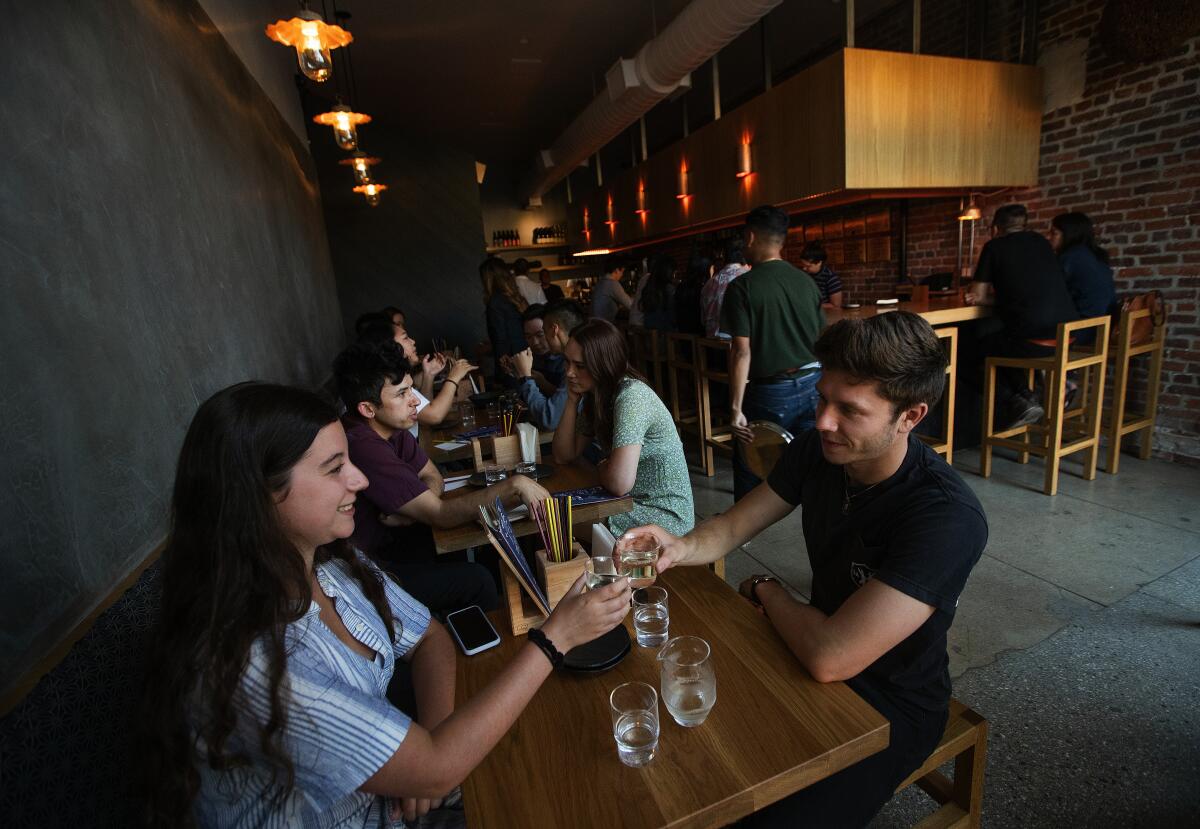
Ototo opened in May, though its blueprint has been years in the making. Namba and Kaplan started their first restaurant, Tsubaki, in February 2017. Its izakaya model merges their personal and professional backgrounds. Namba grew up in Los Angeles; the steamed, fried and grilled dishes he prepares hearken to his Japanese heritage. Kaplan worked at Manhattan’s long-running Decibel, an izakaya known for its geeked-out sake program.
I live in Echo Park. I don’t know of a better dining option in the area than dinner at Tsubaki — perhaps Namba’s Dungeness crab chawanmushi, a skewer or two of chicken oyster yakitori and a finale of grilled abalone paired with Fukucho “Forgotten Fortune,” a sake whose description by Kaplan reads, “Made using a previously extinct variety of heirloom rice revived by the brewer herself.”
When I ask Yoshihiro Sako of Den Sake Brewery whether his first love was wine or sake, he answers slowly, as if it were a trick question.
Soon after they launched Tsubaki, the landlord informed Namba and Kaplan that the 1,000-square-foot hair salon next door was moving out. Did the couple want the space?
Sure, they said, not even yet imagining what they’d do with it. A luncheonette featuring rice bowls, maybe? But as Tsubaki settled in, Kaplan was energized by customers’ response to her depthless enthusiasm for sake. Ototo (Japanese for “little brother”) found its theme organically.
The place is snug: six tables and an 11-seat bar; blond woods, concrete, one exposed brick wall. Unlike often-booked Tsubaki, tiny itself with only 35 seats, Ototo doesn’t take reservations. A wait for two spots these first few months has rarely exceeded 20 minutes.
Behind the bar hang two rows of placards with names and descriptions of sakes written in marker. Kaplan likens them to shelf talkers in indie bookstores: They are staff favorites, inducements for wading in. Ask for something refreshing to kick off an evening, and Kaplan might pour you an extra-dry sake called Daina, crisp with summery flashes of blueberries and melon. Or maybe she’ll reach for a bottle of Taka Tokubetsu Junmai and mention how the brewer, Takashiro Nagayama, spent time in Chablis and coaxes unusual minerality out of his sake.
Speaking of Chablis: Kaplan, who worked as a sommelier at Bestia when she first came to town, also has a pitch-perfect palate for wine. At Tsubaki, she zeros in on left-of-center French varietals; at Ototo, she has a handful of small-production, natural-leaning beauties including an herbaceous Vinca Minor rosé.
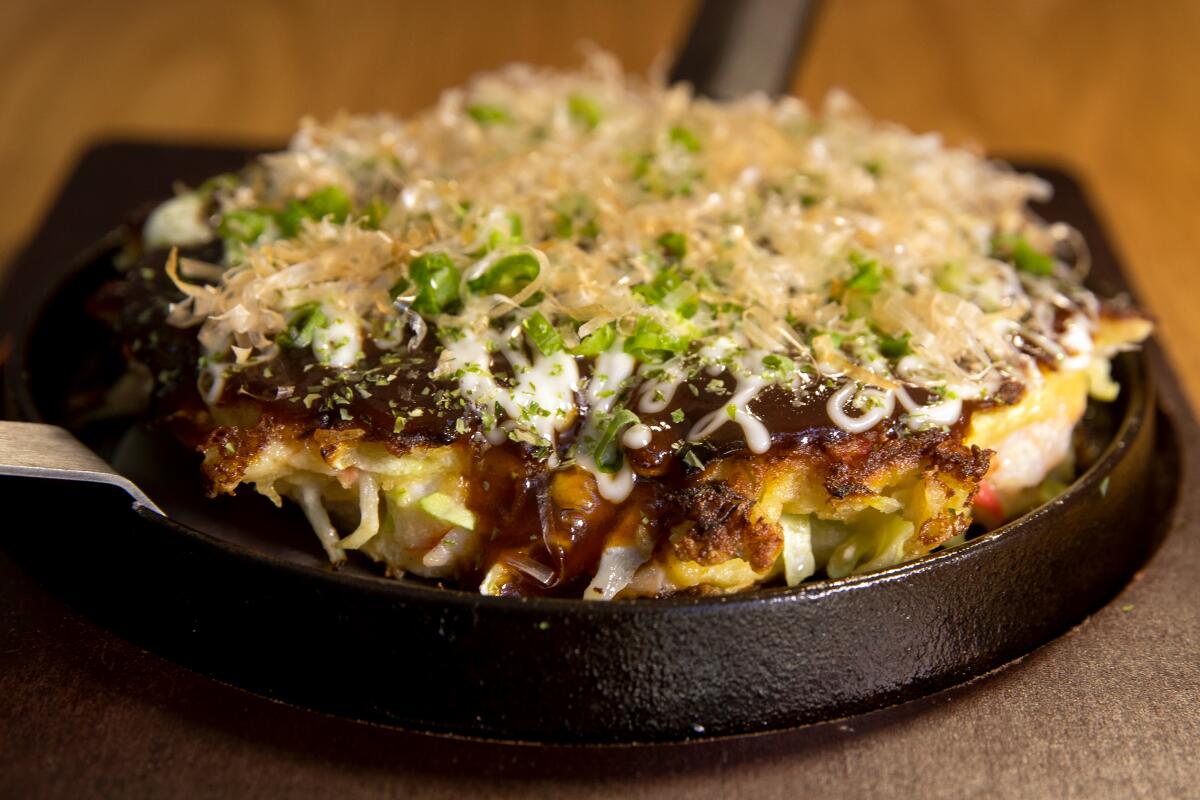
Alongside a glass of something invigorating, start with a freeform mound of hirame crudo joggled with yuzu, or a variation on goma-ae of haricots verts in a subtle sesame dressing. If you’re careening into sakes with mushroomy or nutty characteristics, or if you’re plainly hungry, munch on kara-age; the hunks of fried chicken loll in a shallow pool of sweet and sour sauce.
Namba’s miraculously tidy chili burger sits tall with its thick slice of tomato, shredded lettuce falling like ringlets and domed sesame bun. It’s an ode to the Japanese fast food chain Mos Burger, which, in turn, was originally inspired by founder Atsushi Sakurada’s trips to the Original Tommy’s in L.A. in the 1960s. If people aren’t two-handing the burger, they’re faceplanting into the immaculate chicken katsu sando.
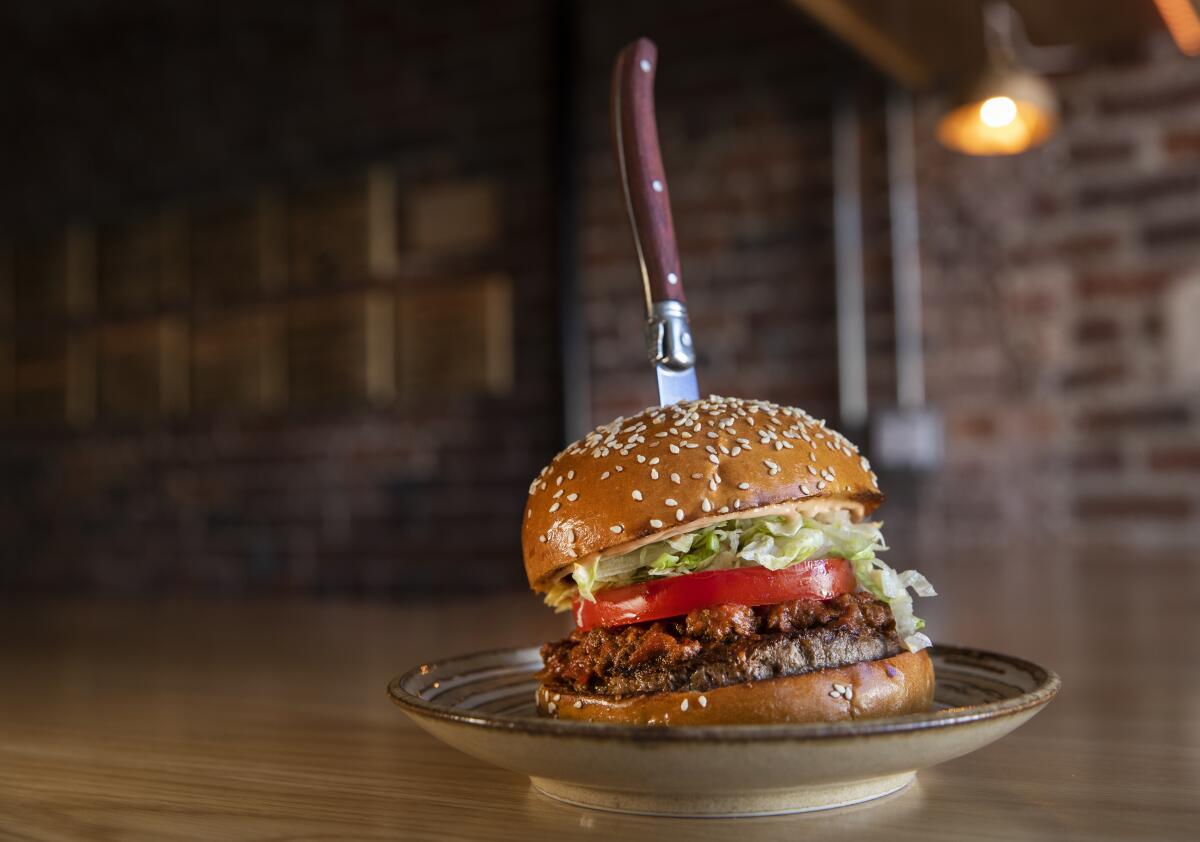
The menu has two ongoing specials: oden, a stew of meats braised in dashi that’s a typical winter dish in Japan (and which I’ll be more compelled to revisit when the nights grow chillier), and okonomiyaki, the savory pancake often built on cabbage squiggled with saucy condiments. Ototo’s version has been a work in progress; an early take with pork belly was too much of a fatty, gloppy muddle. The latest rendition, with squid and shrimp, finds the right proportions of composure and chaos, with enough heft to carry you through another glass or two.
Or to sustain you before a game. Being in Echo Park, Kaplan dreams of customers swinging by in their blue jerseys before a night at Dodger Stadium, treating Ototo as one might a neighborhood wine bar, staying for 20 minutes or an hour, one stop during a relaxed evening out. This is the place where sake can be known in its accessible, manifold glories. This is Los Angeles at the cusp of the 2020s. I see Kaplan’s dream coming true.
Ototo
More to Read
Eat your way across L.A.
Get our weekly Tasting Notes newsletter for reviews, news and more.
You may occasionally receive promotional content from the Los Angeles Times.
